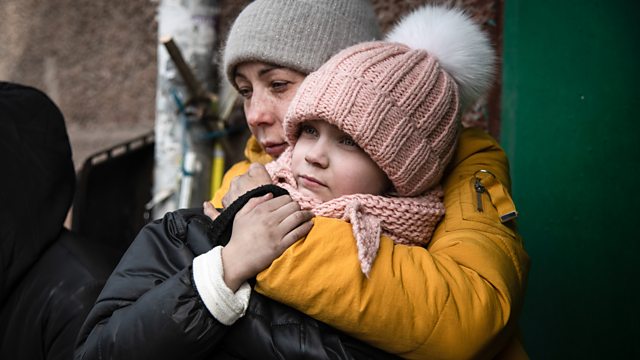War trauma and mental health
Millions of adults and children have their lives turned upside down by war and conflict. What mental health support helps and does it reach those who need it?
War and conflict turns lives upside down and millions of adults and children witness atrocities, lose loved ones and often lose their homes and even their countries. The psychological and emotional suffering can continue long after the immediate threat to their life has gone. One in every five people touched by war – that’s 20% - will have a mental health problem that needs help and one in twenty or 5% will be severely affected.
As the humanitarian crisis deepens in the Ukraine with millions under bombardment and ten million people forced from their homes, Claudia Hammond and her guests explore the evidence behind the mental health interventions that do take place around the world: do they work and are they reaching the people who need them?
Two Ukrainian psychiatrists tell Claudia about the psychological support they’re trying to coordinate for their traumatised fellow Ukrainians. Dr Iryna Frankova is also a psychologist and she’s chair of the ECNP Traumatic Stress Network and with colleagues she’s helped to launch a new downloadable chatbot which offers information and psychological first aid. Dr Orest Suvalo from the Institute of Mental Health at the Ukrainian Catholic University is in Lviv in the west of Ukraine and he’s been trying to coordinate care for fleeing citizens as they arrive at the city’s railway station.
Claudia’s panel includes Bill Yule, Emeritus Professor of Applied Child Psychiatry at Kings College, London, who pioneered evidence-based interventions for children caught up in war and trauma (he’s one of the founders of the Children and War Foundation set up in the 1990s during the wars in the Balkans); Professor Emily Holmes from the department of psychology at the University of Uppsala in Sweden who uses the power of mental imagery to reduce traumatic, intrusive memories or flashbacks (she’s been using these techniques to develop treatments for refugees who have fled war and conflict) and Dr Peter Ventevogel, psychiatrist and medical anthropologist and senior mental health officer with UNHCR, the refugee agency at the United Nations.
And Dr Kennedy Amone P’Olak, Professor of Psycho-traumatology at the University of Witwatersrand in South Africa joins from Uganda, where he’s tracked the mental health of hundreds of the children and young people who were abducted and recruited by the Lord’s Resistance Army in Northern Uganda.
Produced by: Fiona Hill and Maria Simons
Studio Engineers: Phil Lander and Emma Harth
Picture, mother hugs her son outside their destroyed home in Mariupol, Ukraine, Credit: Photo by Maximilian Clarke/SOPA Images/LightRocket via Getty Images
Last on
More episodes
Previous
Broadcasts
- Sat 2 Apr 2022 18:06GMT91�ȱ� World Service
- Sun 3 Apr 2022 11:06GMT91�ȱ� World Service

